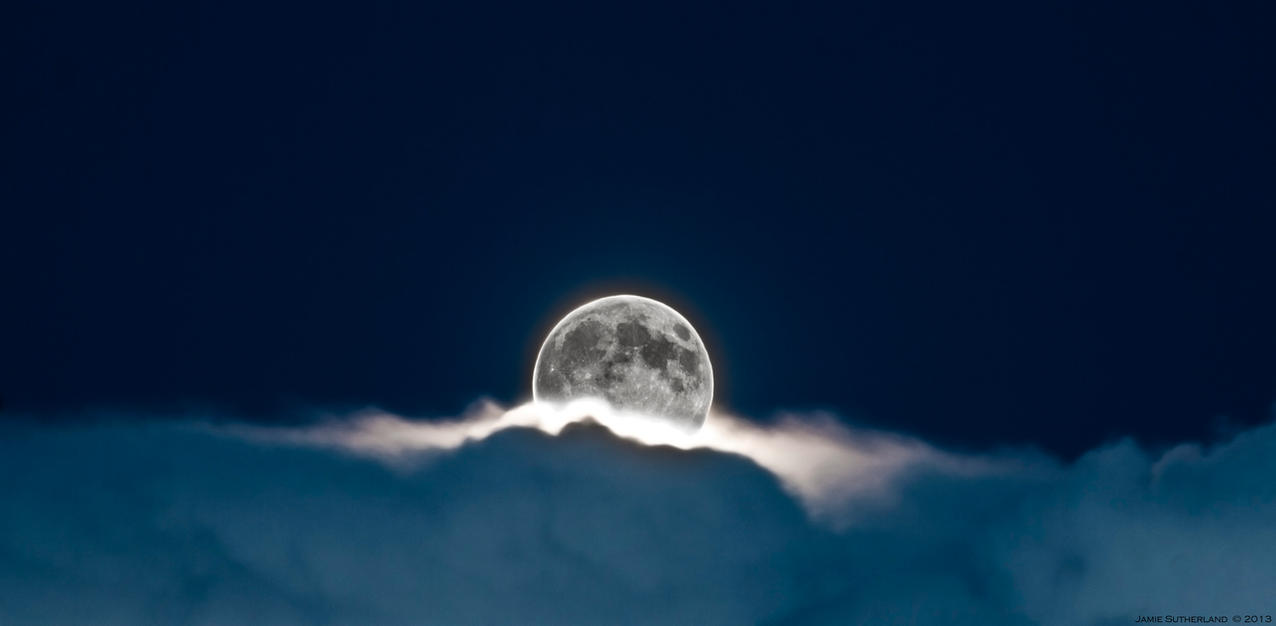Above Cold Mountain the moon shines alone
by Han-shan (Cold Mountain)English version by Red Pine
Original Language Chinese
Above Cold Mountain the moon shines alone
in a clear sky it illuminates nothing at all
precious heavenly priceless jewel
buried in the skandhas submerged in the body
| -- from The Collected Songs of Cold Mountain, Translated by Red Pine |
| More Poems by Han-shan (Cold Mountain) | Next Poem >>

/ Image by Temporalvisions /
View All Poems by Han-shan (Cold Mountain)
As a young man, Han-shan was apparently part of the privileged civil servant class, but he left his family and wealth at about age thirty to take up the life of a hermit poet, settling in a remote cave beneath a rocky overhang. It was from this natural retreat that Han-shan took his name, which means Cold Mountain or Cold Cliff.
Since Cold Mountain is Han-Shan's name translated into English as well as the place where he lived, when he says "Above Cold Mountain the moon shines alone" it has a double meaning: He could be describing a moment in nature being observed, but he is also saying that the moon is shining above himself.
The moon, especially the full moon, has a specific metaphoric meaning in the sacred poetry of Asia. It is often used to represent the fully awakened awareness, Buddha-mind. So this poem can be read as a declaration of enlightenment. This is made doubly clear in the final lines where he says that this "heavenly... jewel" is "submerged in the body." That is, his real subject is the "moon" of enlightenment found within.
To say that the moon "shines alone" might suggest the recognition that there is nothing other than that enlightenment. This is a nondualist statement, understood to be saying there is only Buddha-mind, only enlightenment, and nothing else truly exists.
I especially like the second line:
in a clear sky it illuminates nothing at all.
We might think of the sky is the mind, the canvas of awareness. When it is clear, the mind is free from thoughts, free from fluctuations and distracting movement. The mind is no longer agitated or trying to force reality into mental forms. Instead it finally sees reality unfiltered.
But, in that clear sky, the moon, the light of enlightenment, "illuminates nothing at all." The moon that shines down on Han-Shan shines on nothing. In that moment of pure illumination, he recognizes the nonexistence of the objects of the mind. The only reality is the illumination itself. There is only the moon, quietly, blissfully shining...
He shifts the imagery and begins to use more technical language in the next two lines. The moon shining in the sky is now described as a "heavenly priceless jewel" that is hidden or buried in the body and something called the "skandhas."
This might need a little extra explanation. The five skandhas, according to Buddhist thought, are the five aspects that make up a sentient being. They are material form, sensation, perception, mental tendencies, and cognition. While these allow for basic perception, understanding, and interaction with the world, they also limit the full and open awareness. They tend to reinforce the illusion of tangibility, a false idea of self, and they create attachment to an ephemeral and continuously changing phenomenal reality. All of this, in turn, leads to confusion and suffering.
But, here is their secret: Hidden within these problematic aspects of mundane consciousness is the glowing nugget, the heavenly jewel of radiant pure awareness.
Notice also the balance Han-shan gives us with these two images of enlightenment: On the one hand, enlightenment is like looking out at the full moon in the clear night sky -- expansive, intangible, outward focused; on the other hand, it is discovering a jewel buried within the body and mind -- contractive, internal, earthy. It is as if he has painted for us in words an image of Yin and Yang. Enlightenment is really the two recognized as one.
Recommended Books: Han-shan (Cold Mountain)

